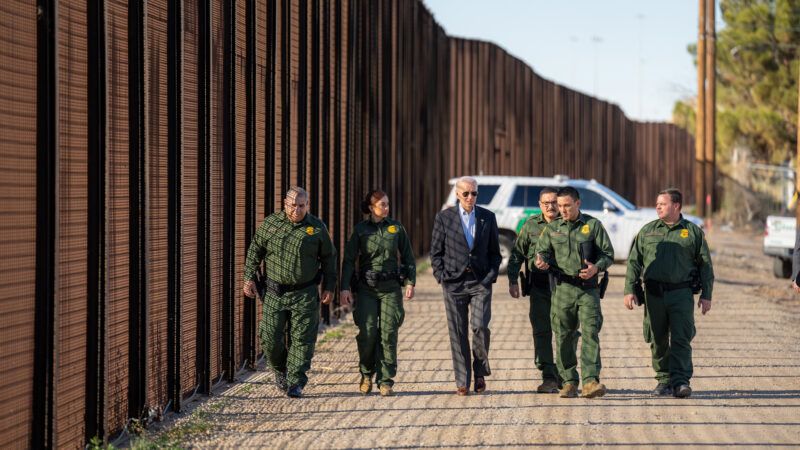Here's What the Hamas Attack Tells Us About U.S. Immigration Policy: Nothing
Conflating these issues only serves to make the debate over U.S. immigration policy more toxic and stupid than it already is.

In the middle of his statement responding to last weekend's barbaric attacks in Israel, Florida Gov. Ron DeSantis veered sideways into a non-sequitur about American immigration policy.
In a post to X (formerly known as Twitter), DeSantis said President Joe Biden ought to freeze all foreign aid flowing to Hamas, the terrorist group responsible for Saturday's attacks that left more than 1,000 people dead, and freeze money "made available to Iran." Then, DeSantis added, Biden must "immediately shut down America's wide-open southern border to ensure we are in a position to better protect Americans here at home from these real threats."
That is…quite the jump.
Yes, it's true that Saturday's attack on Israel involved people crossing a border, and that immigrants coming to the U.S. also cross a border as part of that process. That's literally the only similarity.
To be clear: Immigrants seeking to come to the U.S. to live and work are absolutely not terrorists conducting a paramilitary operation. Mexico and the U.S. are not Israel and Palestine. And, as Saturday's attack makes obviously clear, even the most extreme measures designed to "shut down" a border can be defeated.
Conflating these issues only serves to make the debate over U.S. immigration policy more toxic and stupid than it already is.
Unfortunately, DeSantis is not the only one doing this. Former President Donald Trump, never one to care much about accurately describing the status of U.S. immigration policy, claimed in a TruthSocial post on Monday that "the same people that raided Israel are pouring into our once beautiful USA, through our TOTALLY OPEN SOUTHERN BORDER, at Record Numbers."
Meanwhile, former South Carolina Gov. Nikki Haley—who has at times seemed like the metaphorical adult in the room during this GOP presidential primary contest—made a similar claim during an appearance on Meet the Press on Sunday. "We have to remember that what happened to Israel could happen here in America," Haley said. "We have an open border. People are coming through; they're not being vetted."
There is no internal logic whatsoever to these comparisons.
Let's start with the most acute problem. There are not many borders in the world more heavily militarized than the one between Israel and the Gaza Strip. It should stand in stark contrast to how these Republican politicians are describing America's southern border.
In fact, the Gaza border wall went far beyond anything that would be feasible or affordable for the U.S./Mexico border. As Amir Tibon, a journalist who survived Saturday's attack in Israel, described to The Atlantic on Monday, the structure included an "underground wall" meant to prevent Hamas from digging tunnels.
And guess what? The wall didn't work.
"This was a major infrastructure project for the state of Israel. And that project allowed us to sleep at night, because you can deal with rockets falling over your head if you have a safe room in your house, but if terrorists are infiltrating underground and they can walk into your community, that's a game changer," Tibon told The Atlantic's Yair Rosenberg as part of a harrowing, must-read interview.
"And in the morning hours of Saturday, October 7, when we heard the gunfire outside our window, we realized that this project is an utter and complete failure," he added.
Journalists should ask DeSantis (and Trump, and Haley, and others making this nonsensical comparison) what exactly he'd like to see done on the U.S./Mexico border. Are they asking for a level of militarization that exceeds what Israel has done on its border with Gaza? Because that's what this comparison implies, and even then Saturday's incursion should cause some rethinking about how useful walls on borders can be.
But even thinking about this comparison at that level seems absurd, given how many other problems there are with making the Israel-is-to-Gaza as the United-States-is-to-Mexico comparison. Thankfully, the U.S. has not been in a decades-long, slow-simmering conflict with our neighbor to the south—though some Republicans now seem eager to start one. There is no terrorist organization in Mexico motivated by centuries-old religious and cultural hatred that refuses to recognize the legitimacy of the American state or the rights of the people who live in it.
Most importantly, there is little evidence that any terrorists seeking to harm Americans are passing through the southern border. Conservatives often point to the fact that individuals named on various terror watch lists are occasionally apprehended while trying to cross the border—and use those incidents to extrapolate a massive but unseen threat to America.
In reality, that reflects how overly broad America's terror watch lists have become. They include well over 1 million names, including many individuals who have never planned or attempted to attack America. As the Cato Institute's Alex Nowrasteh has pointed out, "zero people have been killed or injured in attacks on U.S. soil committed by terrorists who illegally crossed the Southwest border."
Indeed, the best way to focus on whatever actual threats might exist would be to allow more immigrants into the country legally—leaving only those who cannot clear background checks to be sneaking over the fence illegally. That's the opposite of shutting down the border.
Immigration policy and anti-terrorism policies are both core functions of the federal government and right now both have deep flaws. We deserve leaders who take these issues seriously, but this sort of flippant and obviously faulty conflation of the two doesn't accomplish anything productive. If a politician can't tell the difference between migrants coming to the U.S. for jobs and terrorists hell-bent on murder and mayhem, they shouldn't be trusted with making federal policy in either arena.


Show Comments (266)